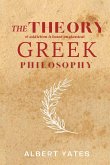Philosophy, unlike every other science, inquires into itself. Any inquiry that inquires into itself may be called a reflexive discipline, since it is about itself. By noting the reflexivity of philosophy, we absolutely do not mean to restrict the philosopher's domain of inquiry to the activity of philosophizing. Indeed, philosophy takes as its object more than just philosophy. Unfortunately, though this little fact is widely acknowledged, it hardly earns our respect. When we, as philosophers, take the reflexivity of philosophy as our object, we discover it to be a source of philosophical problems, the depths of which have rarely been plumbed. Of course, our very inquiry into the reflexivity of philosophy is itself a higher order instantiation of this reflexivity, and empirical proof of the reflexivity of philosophical thought. Still, the aim of this treatise is not to ponder the reflexivity of philosophy per se, but to inquire into the being of universality. Why the being of universality is one of the central issues to philosophy, as a reflexive discipline, is the topic of this short propaedeutic.








